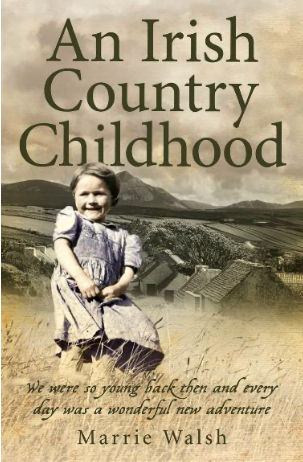Terminale > Mission Bac LLCER Anglais > Mes sujets de bac > Voyages, territoires, frontières
VOYAGES, TERRITOIRES, FRONTIÈRES
Exercice d'application
Annales
-
« Voyages, territoires, frontières »
Partie 1 :
Prenez connaissance des documents A, B et C et traitez le sujet suivant en anglais :
Write a commentary on the three documents (about 500 words): taking into account the specificities of the documents, analyse how they deal with the issue of Irish heritage.
Partie 2 :
Traduisez le passage suivant du document B en français :My father and mother should have stayed in New York where they met and married and where I was born. Instead, they returned to Ireland when I was four, my brother, Malachy, three, the twins, Oliver and Eugene, barely one, and my sister, Margaret, dead and gone.
When I look back on my childhood, I wonder how I survived at all. It was, of course, a miserable childhood: the happy childhood is hardly worth your while. (l. 1-6)
DOCUMENT A
‘Belfast’ Review: A Boy’s Life
In this charming memoir, Kenneth Branagh recalls his childhood in Northern Ireland through a rose-tinted lens.Romanticism reigns in “Belfast,” Kenneth Branagh’s cinematic memoir of his childhood in a turbulent Northern Ireland. From the lustrous, mainly black-and-white photography to the cozy camaraderie of its working-class setting, the movie softens edges and hearts alike. The family at its center might have health issues, money worries and an outdoor toilet, but this is no Ken Loach-style deprivation: in these streets, grit and glamour stroll hand-in-hand.
Viewed largely through Buddy’s eyes, “Belfast,” which opens in August, 1969 (after a brief, colorful montage of the present-day city), is about the destruction of an idyll. Mere minutes into the film, a hail of Molotov cocktails ignites the friendly neighborhood where Catholics and Protestants live amicably side-by-side. A swirling camera conveys Buddy’s confusion and terror; yet, even as the barricades go up and the local bully-boy (Colin Morgan) tries to draw Buddy’s Protestant family into his campaign to “cleanse the community” of its Catholic residents, the movie refuses to get bogged down in militancy. Instead, we watch Buddy play ball with his cousins; moon over a pretty classmate; watch “Star Trek” and Westerns on television; and spend time with his loving grandparents (Judi Dench and Ciarán Hinds). Drawing from his own experiences, Branagh crafts nostalgic, sentimental scenes suffused with some of Van Morrison’s warmest songs. Family visits to movies like “Chitty Chitty Bang Bang” (1968) add wonder and fantasy to Buddy’s life and a clue to his future career. They also offer an escape from a conflict he doesn’t understand and his director refuses to elucidate. Snippets of television news play in the background, but the growing Troubles that would tear the country apart are not the story that Branagh (whose family moved to England when he was nine) wants to tell.
So while “Belfast” is, in one sense, a deeply personal coming-of-age tale, it’s also a more universal story of displacement and detachment, located most powerfully in Balfe’s1 fierce, shining performance. Her authenticity steadies the heartbeat of a film whose cuteness can sometimes grate, and whose telescoped view offers little sense of life beyond Buddy’s block. Branagh’s remembrances may be idealized, but with “Belfast” he has written a charming, rose-tinted thank-you note to the city that sparked his dreams and the parents whose sacrifices helped them come true.
Jeannette Catsoulis, The New York Times, Nov. 11, 2021
1 Caitríona Balfe is an Irish actress. She plays the part of Buddy’s mother in the film.
DOCUMENT B
My father and mother should have stayed in New York where they met and married and where I was born. Instead, they returned to Ireland when I was four, my brother, Malachy, three, the twins, Oliver and Eugene, barely one, and my sister, Margaret, dead and gone.
When I look back on my childhood I wonder how I survived at all. It was, of course, a miserable childhood: the happy childhood is hardly worth your while. Worse than the ordinary miserable childhood is the miserable Irish childhood, and worse yet is the miserable Irish Catholic childhood.
People everywhere brag and whimper about the woes of their early years, but nothing can compare with the Irish version: the poverty; the shiftless loquacious alcoholic father; the pious defeated mother moaning by the fire; pompous priests; bullying schoolmasters; the English and the terrible things they did to us for eight hundred long years.
Above all – we were wet.
Out in the Atlantic Ocean great sheets of rain gathered to drift slowly up the River Shannon and settle forever in Limerick. The rain dampened the city from the Feast of the Circumcision to New Year’s Eve. It created a cacophony of hacking coughs, bronchial rattles, asthmatic wheezes, consumptive croaks. It turned noses into fountains, lungs into bacterial sponges [...]
From October to April the walls of Limerick glistened with the damp. Clothes never dried: tweed and woolen coats housed living things, sometimes sprouted mysterious vegetations. In pubs, steam rose from damp bodies and garments to be inhaled with cigarette and pipe smoke laced with the stale fumes of spilled stout and whiskey and tinged with the odor of piss wafting in from the outdoor jakes where many a man puked up his week’s wages.
The rain drove us into the church – our refuge, our strength, our only dry place. At Mass, Benediction, novenas, we huddled in great damp clumps, dozing through priest drone, while steam rose again from our clothes to mingle with the sweetness of incense, flowers and candles.
Limerick gained a reputation for piety, but we knew it was only the rain.
Franck McCourt, Angela’s Ashes, 1996
DOCUMENT C

Cover of An Irish Childhood, by Marrie Walsh, Metro Books, 2010
